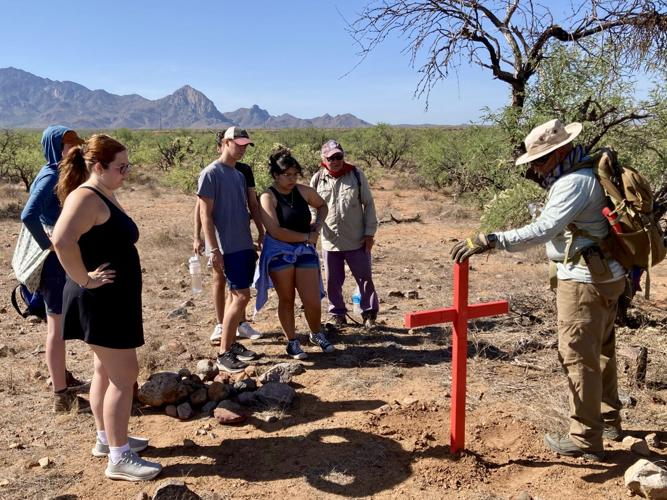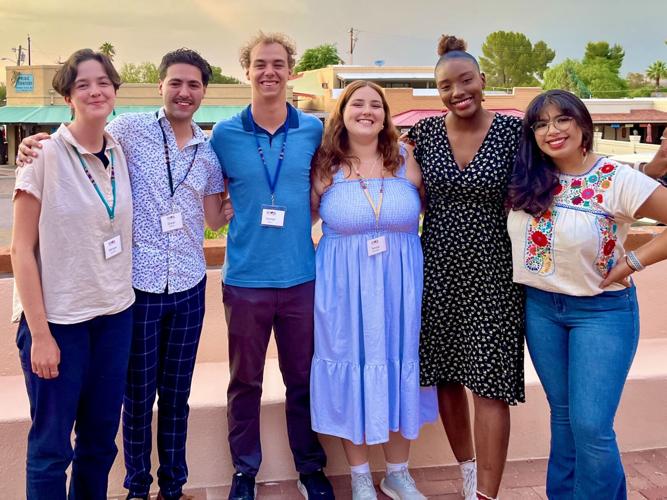The deadline for an "immersive," paid internship in the borderlands through Tubac-based Border Community Alliance is coming up on Jan. 31.
College or graduate students, 18 and older, are eligible to apply for the nonprofit’s six-week "Borderlands Ambassador" internship, which offers a $1,200 stipend and free housing in Nogales, Arizona.
The program, which will run from June 11 to July 27 this year, aims to deepen interns' understanding of the borderlands through dialogue with artists, advocates, migrants, policymakers, business owners and others living in southern Arizona and northern Sonora. Ideal candidates will have at least a conversational level of Spanish-language skills, and a valid passport is necessary.
A service-learning component gives interns hands-on experience volunteering with nonprofits on the border. Last year, interns worked at a migrant-aid shelter in Nogales, Sonora and at Casa Alitas' Welcome Center for migrants in Nogales, Arizona. Interns will also accompany humanitarian workers on desert water drops in southern Arizona.
But the program is about more than immigration issues, said internship supervisor Amy Tice. Interns also visit with public officials, environmentalists and local businesses that work across the international boundary line. They've taken tours of maquiladora factories in Nogales, Sonora, which employ millions in the border regions of Mexico, and met with fruit processors in Nogales, Arizona, she said.
"It’s an incredibly rich and diverse area. We’re just helping them to get that full picture of what’s happening down there," she said.
The internship works to dispel myths about the border and to help create a new generation of informed leaders, who can be ambassadors in diverse fields, Tice said.
“Part of what we talk about, especially as we’re starting to wrap up (the program), is the, ‘So what?’ and ‘Now what?’” she said. “As the students and myself are going back to our own communities, how can we continue to bridge the border and foster community through providing education or stories or sharing of experiences?”
Border Community Alliance, a nonprofit which recently marked 10 years of binational community-building, offers guided tours in Mexico and supports nonprofits in Sonora, through a partnership with a Sonoran community foundation that distributes American donations to vetted organizations.
Teresa DiGerolamo, 21, said her BCA internship last summer was eye opening. Her fellow interns came from all over the country — from New York, Washington, D.C., San Francisco and Houston — and their academic focuses ranged from public health to political science to pre-med, said DiGerolamo, who is from New Orleans.
“We’re all coming from these different disciplines, with an interest in the borderlands,” said DiGerolamo, now a senior at University of Southern Mississippi, majoring in political science and Spanish. “Truthfully, it is one of the most unique opportunities I think is available for my age group.”
On days off, interns had free time to explore the desert environment, DiGerolamo said.
“The beauty of the southern Arizona geography is just not like anything you imagine,” she said.
Danna Lopez, who was a BCA intern in 2022, was born in Mexico but raised in Mesa, Arizona from age 4. She graduated from Arizona State University last year and is now in her first year of law school at Boston University.
Lopez, 22, said she grew up seeing the fear on the faces of her undocumented parents, who overstayed their visas to raise their children in the U.S. The fear remained even after their status was regularized, she said.
“I still vividly remember having to assimilate, having to be told by my family, ‘For your protection, it’s important for you to only speak Spanish at home,’” said Lopez, who wants to specialize in immigration law. “That’s something I internalized at a very young age.”
She felt a connection to the migrants she and her fellow interns assisted during the BCA internship, and she also was struck by the ways in which her family had been fortunate for not having to risk their lives crossing through the desert.
“It’s definitely very heart-wrenching to know that people are forced to engage in these dangers in order to have the chance at a better life, and this is their last resort,” she said.
The internship left her with an appreciation for complementing academic study with on-the-ground community work, she said.
“Although I’m in law school, which can be removed from the community, I make an effort to volunteer and get involved in community organizations here in Boston,” she said. “The emphasis on community has really stayed with me, even after all this time.”
While some interns come into the program with an academic project in mind, others discover an area of research while in the field, said Tice, who is a professor at Husson University in Maine when she’s not in Arizona.
After the BCA internship, DiGerolamo said she ended up focusing her senior thesis on the relationship between border enforcement agents and aid workers who assist the migrants released by Border Patrol into the community. She was struck by the optimism of so many who live and work in southern Arizona, she said.
“It’s a very hopeful community,” she said. “The biggest surprise is how just mobilized these humanitarian groups are and how interconnected they are. … It really is a huge part of the community and culture there that I wasn’t expecting.”
Get your morning recap of today's local news and read the full stories here: tucne.ws/morning





